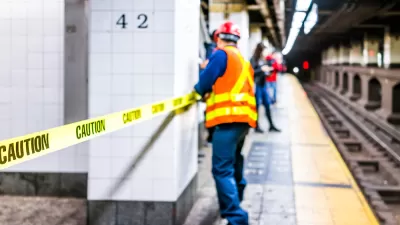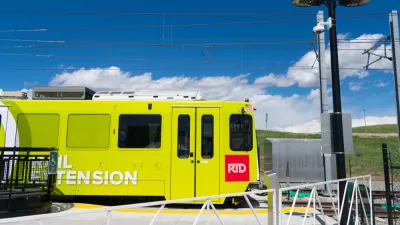A vague threat, present since the beginning of the pandemic, is now much more defined in New York City, as transit riders get an idea of what pandemic austerity looks like for the city's mobility. Congress can still save transit agencies.

"A 40% cut in weekday subway service and layoffs of more than 9,000 transit workers are on the table as MTA honchos battle a COVID-19 financial catastrophe," reports Clayton Guse.
Andrew Albert, a non-voting rider advocate on the MTA board, is quoted in the article saying that the cuts "would absolutely be an end to the New York way of life."
The New York Daily News obtained the transit austerity plan before other news outlets in the city, getting the scoop on one of the most significant transit stories since the pandemic began to take massive chunks out of the ridership in the city with the nation's most robust and popular transit system.
The fact that the news of the MTA's austerity plan has found its way to the media probably indicates political pressure on Congress and the incoming Biden administration to provide funding to transit agencies around the country, including the MTA.
"But without Congressional support — which might hinge on whether Democrats can win control of the Senate in a pair of runoff elections in Georgia in January — MTA managers expect to cut deep, their plan shows," according to Guse.
The responses of transit agencies to the financial realities of the pandemic have varied by location. In Boston and San Francisco, austerity has focused service toward buses and away from rail. Denver has focused on popular bus service closer to the urban core while also considering large numbers of layoffs. New York City has proposed a collection of bus priority improvement projects that have since encountered stiff opposition from local politicians and neighborhood organizations.
FULL STORY: ‘An end to the New York way of life’: MTA proposes catastrophic service cuts amid COVID-19 budget crunch

Planetizen Federal Action Tracker
A weekly monitor of how Trump’s orders and actions are impacting planners and planning in America.

Chicago’s Ghost Rails
Just beneath the surface of the modern city lie the remnants of its expansive early 20th-century streetcar system.

San Antonio and Austin are Fusing Into one Massive Megaregion
The region spanning the two central Texas cities is growing fast, posing challenges for local infrastructure and water supplies.

Since Zion's Shuttles Went Electric “The Smog is Gone”
Visitors to Zion National Park can enjoy the canyon via the nation’s first fully electric park shuttle system.

Trump Distributing DOT Safety Funds at 1/10 Rate of Biden
Funds for Safe Streets and other transportation safety and equity programs are being held up by administrative reviews and conflicts with the Trump administration’s priorities.

German Cities Subsidize Taxis for Women Amid Wave of Violence
Free or low-cost taxi rides can help women navigate cities more safely, but critics say the programs don't address the root causes of violence against women.
Urban Design for Planners 1: Software Tools
This six-course series explores essential urban design concepts using open source software and equips planners with the tools they need to participate fully in the urban design process.
Planning for Universal Design
Learn the tools for implementing Universal Design in planning regulations.
planning NEXT
Appalachian Highlands Housing Partners
Mpact (founded as Rail~Volution)
City of Camden Redevelopment Agency
City of Astoria
City of Portland
City of Laramie





























